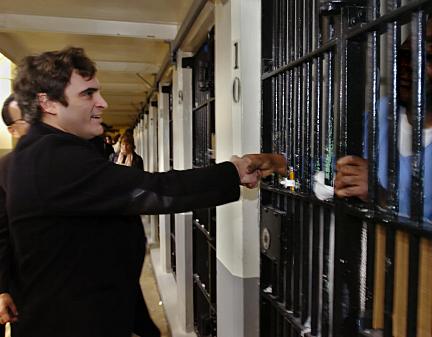
 From the NYTimes:
From the NYTimes:
“Many Americans have come to believe, wrongly, that keeping an outsized chunk of the population locked up is essential for sustaining a historic crime drop since the 1990’s. In fact, the relationship between imprisonment and crime control is murky. Some portion of the decline is attributable to tough sentencing and release policies. But crime is also affected by things like economic trends and employment and drug-abuse rates.”
In a separate but related article, economist Lew Rockwell seems to be arguing that in fact imputation (people become what they are called) occurs in prison (the kind we don’t want) and that is why people so often go back to jail:
“And the communities in which they exist in these prisons consist of other unvalued people, and they become socialized into this mentality that is utterly contrary to every notion of civilization. Then there is the relentless threat and reality of violence, the unspeakable noise, the pervasiveness of every moral perversity. In short, prisons are Hell. It can be no wonder that they rehabilitate no one. As George Barnard Shaw said, “imprisonment is as irrevocable as death.”
At its root, this debate is all about how people change. It is another fascinating example of what we’ve always thought to be true and effective (i.e. punish the criminal, make them an example and they won’t do it again and their friends won’t be tempted to do it either) not working and in fact the opposite being true. The truth is, when people have jobs they tend not to commit as much crime. And while it may be a stretch to call this an instance of grace working out what the law cannot accomplish, it is definitely grace and not the law (or stronger law) that works in these situations, and I’m not the first to say it (I’m probably the last).

COMMENTS
4 responses to “Crime and Punishment”
Leave a Reply













Yes, this is on point. I taught an intro to management course at a prison once and was amazed at how broken and aware of their sin the men were. One could almost feel the frustration in the air…trying to do well on a test, but fully aware that no one would ever believe that they were anything but a crook when applying for a job in the future. They were STARVING for grace, for someone who didn’t care what they did, for a second chance…it was almost embarrassing. I find it humbling when I realize just how much we all want people to be gracious to us, but how unnatural it is to be gracious to others. Anyway, I started writing just because everyone looks like Dave Zahl on this blog–and I was shocked (and a little awed) to see him shaking hands with prisoners in the accompanying photo.
One of my professors here (the only Episcopalian at PTS) told our class that assuming total depravity when working with prisoners was the path to destruction.
“You have to encourage them! Tell them to work hard to be on their best behavior while in prison, and that behavior will carry over once they’re on the outside.”
Is it because “recidivism” is a hard word somehow that no one knows it? Or is it because everyone is in utter denial about the concept attached to the term?
April 26, 2008 1:24 PM
I had to look up ‘recidivism’ to make sure that I knew what it meant. To admit to the concept that we are all ‘repeat offenders’ is really to admit that we need help. How could anyone admit to such a weakness? Definitely something I try to deny…I wish that when I said that I was sorry it meant that I would never do it again as I remember my elementary school teachers telling me and I wasn’t in the pattern of ‘repeat offending.’
When I consider the paradigm that I, a law abiding citizen, am as full of “blame” and “guilt” as one of these convicted fellons, God reveals to me just how desperate of his grace I am.